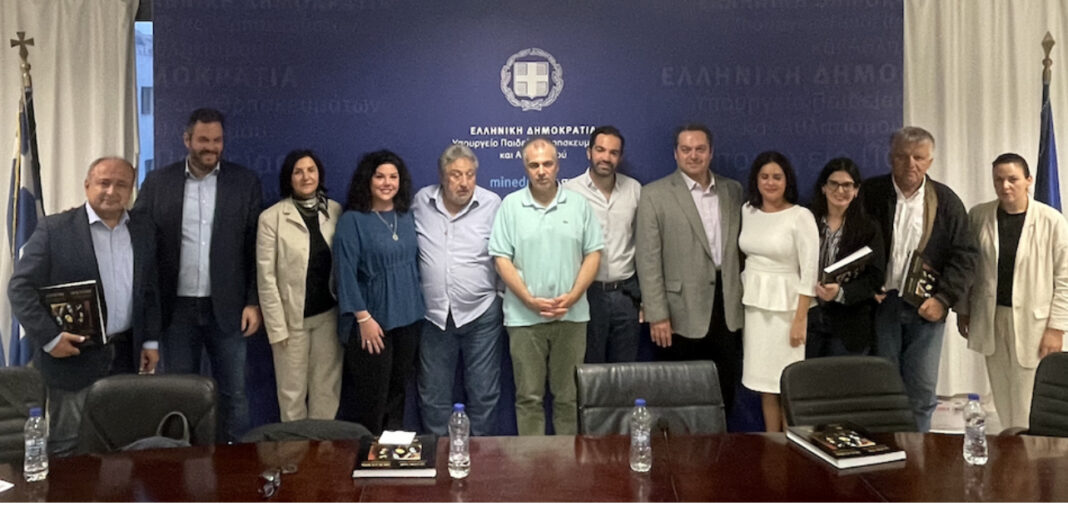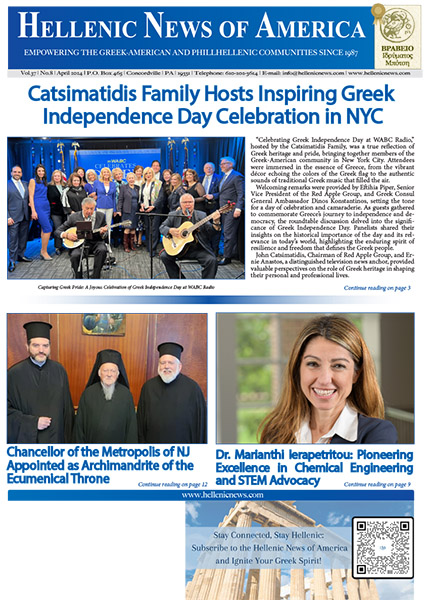By Panos Opliopoios, APE
The Ministry of Education, Religion, and Sports hosted a delegation from the Pontian, Assyrian, and Armenian Associations, along with journalists from Greece and abroad. The goal was to convey requests regarding the respective communities and address key issues requiring answers.
Present at the meeting were Nikos Dimakis, the director of the ministry, Giorgos Kalantzis, the general secretary of Religious Affairs, and ministry officials. The delegation included Stefanos Tanimanidis, Vice President of the World Council of Pontian Hellenism (WCPH) and President of the European Union of Pontian Citizens (EUPC), Kyriakos Batsaras, President of the Assyrian community in Greece, representatives of the Armenian community, and journalists.
Mr. Tanimanidis discussed three issues related to Christian populations in the broader region of Turkey, who suffered persecution and genocide at the hands of the Turks.
The first issue raised concerns the inclusion of the history of Pontian and Black Sea Hellenism in Greek education. Events related to these communities are inadequately represented in Greek textbooks and not sufficiently analyzed.
The second issue pertains to Democritus University and the Department of Language, Literature, and Culture of the Black Sea Countries, which has seen a significant reduction in the number of admitted students from 90 to 15. Additionally, the preservation of the Pontian dialect, which is a historical fact, was highlighted as there is a risk of it being lost over time.
The third issue involved the proposal for online monitoring of the Pontian dialect by universities, schools, and organizations worldwide. It was requested that this initiative be supported by the Ministry of Education, Religion, and Sports through a special European program.
The existence of cultural artifacts from the Monastery of Panagia Soumela in Turkey was highlighted. Many of these artifacts are scattered in various locations and museums in Turkey and should be repatriated. Relevant letters from the Turkish government were presented to the leadership of the Ministry of Education, which align with the respective request and could be promoted promptly.
A suggestion was made to publish a book on the history of the Monastery of Panagia Soumela with corresponding documents and photographs in six languages to provide to the thousands of visitors and pilgrims of the Monastery.
Lastly, the need for the creation of an educational museum for Pontian Hellenism was mentioned. This museum could centralize all the publications and materials that exist.
Kyriakos Batsaras, the President of the Assyrian community in Greece, emphasized the significance of the Christian populations affected by Turkish barbarism during that period.
Efforts are being made to pass down the Assyrian dialect to the younger generation through specialized university-level studies, and there has been interest from the Ministry of Education, Religion, and Sports in supporting this initiative.
Giorgos Kalantzis, the General Secretary of Religious Affairs, referred to an International Conference held in Kalamata a year ago with the theme “The Era of Destruction and the End of Coexistence: Deportations, Displacements, and Genocides, 1912-1924.” This conference identified issues related to the overall policy of extermination of all Christian populations pursued by the Turks and analyzed the events that led to this outcome. The General Secretary emphasized the importance of highlighting the genocide of Christian populations during the period 1914-1922 on an international level.
Regarding the issues raised by Mr. Tanimanidis, it was assured that they would be thoroughly investigated, and appropriate responses would be provided with a positive and supportive spirit.
In terms of educational matters concerning Pontian Hellenism, the creation of a series of seminars dedicated exclusively to this topic was presented, with the aim of compiling an “educational dossier” containing all the relevant information on the subject. The goal is to train specialized experts to preserve and expand the Pontian cultural heritage.
Already in the 1st online seminar, 601 educators from all over Greece participated, and there was significant interest in continuing. The General Secretary mentioned that “in no other seminar organized by the Ministry have so many educators participated.”
For this purpose, a Memorandum of Cooperation was signed between the General Secretariat of Religious Affairs of the Ministry of Education, Religion, and Sports, the Pontian Studies Foundation at Aristotle University of Thessaloniki, and the Academy of Theological Studies of Volos, which is one of the most reputable Think Tanks globally, as the General Secretary pointed out.
Having deep knowledge of the issues concerning the populations and respective communities and based on his previous actions, Mr. Tanimanidis demonstrated his expertise and experience in these matters.
Finally, the General Secretary presented a book titled “The Black Book of the persecutions and martyrdom suffered by Hellenism in Turkey 1914-1918” as a gift. This book is a translation into English and French, containing texts and photographs from the “Black Book” of the Genocide of 1914-1918 of Hellenism by the Turks.
Nikos Dimakis, representing the Director of the Ministry of Education, Religion, and Sports, Mr. Pierre Kacacakis, presented the Ministry’s positions and the personal interest of the Minister in the issue and the support that will be provided to the upcoming actions.
Regarding the proposal for the creation of an Educational Museum for Pontian Hellenism, he expressed support for finding a suitable space to house it.
He proposed the digitization of existing books and textbooks and the creation of a special Mixed Reality AR-VR digital environment that would present images and content in a way that could be viewed either in the museum or online through special applications.
This meeting is part of broader meetings aimed at raising awareness of the issue of the Genocide of Christian populations in Turkey during the period 1914-1922, with the goal of securing a corresponding resolution from the European Parliament.
Within the framework of these actions, new initiatives are being prepared for the coming year, both in Europe and the United States, with the aim of maximizing the issue of the Genocide of Christian populations by Turkey and securing a similar resolution from both the European Parliament and the American Senate.






